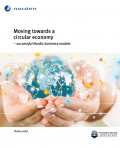
Moving towards a ‘Circular Economy’ is an action that many world business leaders, policy makers, academics and NGOs argue is necessary in order to help solve global environmental and economic challenges. This report summarizes the findings of a project initiated by the Nordic Waste Prevention Group under the Nordic Council of Ministers to make the circular economy thinking more mainstream in the Nordic countries and thereby accelerate the development of circular economy in the Nordic region. In addition to this report, the project also included the organisation of a large multi-stakeholder workshop with participation of more than 60 actors relevant for the circular economy, which was held in in Copenhagen in April 2015.
In this report, there are 18 case examples of Nordic businesses which are part of the Nordic circular economy as well as short policy recommendations, which were suggested at the workshop.
The Green Action Plan (GAP), proposed by the European Commission in 2014, is aimed at helping SMEs turn environmental challenges into opportunities. It focuses on resource efficiency, green entrepreneurship and green skills, eco-innovation, greener value chains, and facilitating market access for SMEs. It also provides tools for the internationalisation of European SMEs, taking advantage of Europe's leadership in green technologies. The Plan complements other EU initiatives, such as the Green Employment Initiative, a Roadmap to a Resource Efficient Europe, Circular Economy and European Industrial Renaissance, and is intended to create synergies between them, using the financing under existing programmes. The actions proposed are intended not only to benefit SMEs and the economy, but also to help address environmental challenges related to resource scarcity, waste management and climate change.
Ministers at the Seventh “Environment for Europe” Ministerial Conference (Astana, 21–23 September 2011) agreed to take the lead in the transition to a green economy and to make a substantive contribution to the discussions on green economy within the context of sustainable development and poverty alleviation at the United Nations Conference on Sustainable Development (Rio+20 Conference). They invited the United Nations Economic Commission for Europe (ECE) to contribute, together with the United Nations Environment Programme (UNEP) and relevant international organizations, to the development of the Rio+20 green economy outcomes.
This report contains the requested overview, which was prepared jointly with UNEP and in consultation with the United Nations Development Programme, the International Labour Organization, the United Nations Educational, Scientific and Cultural Organization, the World Health Organization, the United Nations Industrial Development Organization, the European Environment Agency and the Organization for Economic Cooperation and Development.
This report was prepared in accordance with the “Environment for Europe” (EfE) Reform Plan to support the work of the Seventh EfE Ministerial Conference. It follows the agreed questions for discussion in the multi-stakeholder round tables, describing recent trends, challenges and achievements, as well as recommendations for the way forward.
The document was developed jointly by the United Nations Economic Commission for Europe (UNECE) secretariat and the United Nations Environment Programme to support Conference discussions on this topic of the agenda. The International Labour Organization provided two case studies. The document also reflects comments received from member States.
The cost of existing environment-friendly technologies, such as wind turbines and SO2 scrubbers, needs to be brought down so that they can be deployed on a large scale, while fundamental research needs to advance on the frontiers of technologies such as smart grids or energy storage.
Yet, despite these pressing challenges, European companies in the electricity production sector – the largest greenhouse gas emissions emitter in Europe, with 33% of European emissions in 2012 – spend less than 1% of their turnover on innovation, against 10-15% in IT or pharmaceuticals, suggesting that the incentives to conduct Research, Development and Demonstration (RD&D) of new or enhanced low carbon technologies and their associated systems and processes might not be in place.
The objective of this policy note is to investigate whether the current level of public support to environment-friendly technologies is sufficient to allow European countries to respond to the multiple challenges posed by climate change and other environmental concerns and to discuss the policy interventions that might be needed in order to drive forward clean energy technology investments in Europe.
